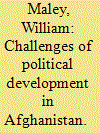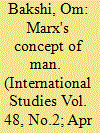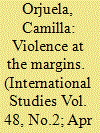|
|
|
Sort Order |
|
|
|
Items / Page
|
|
|
|
|
|
|
| Srl | Item |
| 1 |
ID:
115337


|
|
|
|
|
| Publication |
2011.
|
| Summary/Abstract |
The transition in Afghanistan is manifestly beset by multiple challenges, yet behind obvious issues such as insecurity and corruption lie a range of deeper problems related to the way in which the Afghan political system has developed. Trust deficits, real conflicts of interest, and parallel and potentially conflicting systems of authority, have affected both the mass population-many of whom feel disconnected and disenfranchised-and political elites, which remain severely divided. The combination of a presidential system with a highly centralized formal state structure had fostered patrimonialism at the expense of institutional development. Unless and until these problems are addressed, the likelihood that any Afghan government will be able to take the lead in confronting the country's problems remains low.
|
|
|
|
|
|
|
|
|
|
|
|
|
|
|
|
| 2 |
ID:
117570


|
|
|
|
|
| Publication |
2011.
|
| Summary/Abstract |
Since the changes introduced in Turkey's foreign policy during the 2000s, it has reached a stage that calls for an urgent review of its regional and global strategic choices. This article analyzes Turkish Foreign Minister Ahmet Davutoglu's foreign policy doctrine, examines its limitations and critically evaluates its relevance to current foreign policy-making. Recent events in the Middle East pose a challenge to the soft power, 'zero conflict' policy introduced by Davutoglu. Consequently, Turkey's foreign policy rhetoric over the past two years has hardened, triggered by uncertainties in Turkey-European Union (EU) relations, the deterioration in its relationship with Israel, and the Arab Spring events that have engulfed countries in its periphery. Since the EU plays an important role in terms of the democratic and economic transformation of Turkey, the country's accession to the EU would be important in ensuring both the continuance of its soft power strategy and its security strategy in line with Davutoglu's 'strategic depth' doctrine.
|
|
|
|
|
|
|
|
|
|
|
|
|
|
|
|
| 3 |
ID:
117568


|
|
|
|
|
| Publication |
2011.
|
| Summary/Abstract |
For long, the feeling has been that Marx views man essentially in terms of his material interests. The publication of Economic and Philosophical Manuscripts, however, has led many to realize that he is keenly interested in developing individual potentialities, realizing 'human essence' and nurturing talents. What is interesting, however, is that Marx relies on productive activity, on labour, to give meaning to life. How work in factories, however rationally organized, can be a source of joy and fulfilment is hard to see. It is, therefore, not surprising that when he touches upon these issues in later writings, few though these occasions are, he relies more on intellectual, literary and artistic pursuits than on labour. No matter which activity we pursue, however, we can profitably pursue it, says Marx, only in a communist society. Thus, he attaches great importance to reorganizing the economic aspect of society. But strangely he does not think that bringing about these changes, building a better society, would give meaning to life. In any case, Marx's plea to develop potentialities, realize 'human essence' and foster creativity did not have much relevance for societies characterized by poverty, privation and exploitation that existed in his time. It is, therefore, not surprising that in his later writings he is concerned more about the problems facing society, especially the miserable condition of workers. This leads him to make a careful analysis of the existing reality. Those interested in the study of politics and society today, especially in countries like India, which are facing major problems, need to pay more attention to the approach Marx adopts in his later writings.
|
|
|
|
|
|
|
|
|
|
|
|
|
|
|
|
| 4 |
ID:
115338


|
|
|
|
|
| Publication |
2011.
|
| Summary/Abstract |
The security sector in Afghanistan has received intense international assistance and the investment of many billions of dollars in the nearly ten years since the fall of the Taliban regime, yet the country is still unable to maintain security and stability. While there are many obstacles to reform in the Afghan context itself, not the least being the present insurgency, the international community has made many mistakes that have prevented success. The police is perhaps more important than the military in peace-building, but it is the weakest of all the security forces. There have been three phases of police reform as the international community has tried to find the best approach, but the one factor that has not changed and is the greatest impediment to reform is the insistence on using a 'military model' for changing the police, and to use the police more than the army for fighting the insurgency. Now, there is another plan: to prepare the Afghan national security forces to assume leadership and responsibility for security in the country by 2014. Is this another international failure in the making?
|
|
|
|
|
|
|
|
|
|
|
|
|
|
|
|
| 5 |
ID:
115336


|
|
|
|
|
| Publication |
2011.
|
| Summary/Abstract |
This article updates the arguments about the South Asian regional security complex (RSC) given in Buzan and Wæver's (2003) Regions and Powers (RaP). In terms of the South Asian RSC itself, there have been lots of events, but little in the way of structural change from the analysis in RaP. In terms of South Asia's regional context, the picture is mixed. In relation to the Gulf, there has been a minimal structural change. However, in relation to East Asia, there are more signs of interaction between the South and East Asian regional security complexes, mainly hinging on the rise of China. This is not yet sufficient to talk of the two having merged, but a wider Asian supercomplex is clearly emergent and becoming stronger. In terms of South Asia's position in the global system, India's claim for great power status is now plausible, though the role of the United States in both East and South Asia remains similar. But, the global level itself is probably moving towards a scenario in which a system, containing several great powers and no superpowers, becomes more regionalized. This trend has deep roots, and the key question for India is what balance it wants to establish through its engagement with its own region, the wider East Asian region, and at the global level.
|
|
|
|
|
|
|
|
|
|
|
|
|
|
|
|
| 6 |
ID:
117569


|
|
|
|
|
| Publication |
2011.
|
| Summary/Abstract |
This article explores the global dimensions of violent conflict and the parallels and links between violence in the diaspora and the homeland. It does so by discussing Tamil street gangs in London, Toronto and Paris. The Tamil diaspora played a key role in the war between the Sri Lankan government and the Liberation Tigers of Tamil Eelam (LTTE), which raged between 1983 and 2009. In spite of being a marginal phenomenon in the Tamil diaspora, Tamil street gangs became part of a wider culture of fear within the Tamil community and possibly reinforced the LTTE's dominance over and fundraising in the diaspora. Although some of the rivalling gangs have been cast as pro- and anti-LTTE, gang violence cannot be interpreted as a direct continuation of conflict from Sri Lanka but has to be understood in relation to marginalization and identification in the city of residence. In everyday life in the diaspora, 'the gang' has been a way for some young Tamil men to strive for respect, riches and heroism, employing a mixture of references to gang culture and the LTTE and building on both ethnic and geographical identifications. The larger Tamil community, on its part, has been eager to dissociate itself from the street gangs as they threaten the image of the Tamils as law-abiding and well-adjusted migrants.
|
|
|
|
|
|
|
|
|
|
|
|
|
|
|
|
|
|
|
|
|